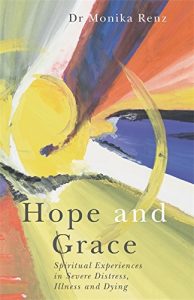 Hope and Grace: Spiritual Experiences in Severe Distress, Illness and Dying by Monika Renz
Hope and Grace: Spiritual Experiences in Severe Distress, Illness and Dying by Monika Renz
Reviewed by David Lorimer
This book follows on from the one I reviewed this time last year – Death – a Transition. It is a study of spiritual experiences in severe distress, illness and dying based on a survey of all the patients in the author’s care over a one-year period, totalling 251, of whom 135 had one or several spiritual experiences. Significantly, 22% of the 135 died within an hour of conveying such an experience. 56% had less fear, while 53% experienced pain relief and an ordered attitude towards life and death. 50% developed a new attitude towards God/the divine and a new spiritual identity. Interestingly, 44% spontaneously reported all their spiritual experiences, which says a great deal about the quality of spiritual care. As for preceding therapeutic and spiritual interventions, the most important was music at 73% then religious support at 63% and empathy or love at 62%.
The liminal sphere is the sphere of betweenness and transformation where the structures of the ego and its controlling software are dissolved. The hope of the title is defined as the basic human condition and openness into which grace enters, either from without or from within, our innermost being. This can be offered by the caregiver and attained by patient. For the patient, the focus of hope gradually transforms from getting well and experiencing good times, then from the hope of living to the hope of dying well, from the hope for oneself to a hope beyond oneself (p. 51). The quality of presence of the caregiver is critical. According to Monika, they must be willing to endure in an empathic way the powerlessness of their patients as well as engaging with their struggle through nothingness and their remoteness from God – characterised by absence. In her case, this means sensitively choosing the form and timing of any intervention given her background in nursing, theology, psychotherapy and music therapy. The reader cannot fail to be impressed by the variety and timeliness of many of her pastoral and therapeutic interventions with patients, which are described in considerable detail. She also reminds us that we encounter necessarily encounter patients as who we are, so there is an accompanying transformative process in the carer.
Peace and freedom are only found beyond the ego with its characteristic modes of struggle, denial and control. Here there is surrender, letting go, finding, integrating into a larger sense of wholeness and deeper order. Just as there is a phase of integration, so there comes a time of disintegration that is paradoxically a simultaneous liberation. I was struck by the reinterpretation of the idea of judgement as appreciation for the life lived. This corresponds to ‘a God who carries and nurtures me, who is pleased when I reach home, who consoles me and is tender, who is gentle and warm.’ I found this such a beautiful and moving image, reminding us that we are ultimately loved and lovable, and able to forgive ourselves. Forgiveness and reconciliation are important themes, since people do not reach peace without going through this process. Bronnie Ware also emphasises this in her book on the five main regrets of the dying, which I reviewed some years ago. She is repeatedly impressed by how difficult it is for ordinary people to forgive themselves, but observes that they nearly all do in the end, reaching peace and an ability to let go. Then they can make their transition.
Ultimately, primordial trust overcomes primordial fear, but the latter needs to be acknowledged in our vulnerability in relationship, whether to fellow human beings or the Divine. For Monika, the question of whether we find our way to a spirituality of relatedness is the fateful question for Western culture. This transcends our tendencies towards self-protection, self-determination and the quest for power. She sees us as part of a whole, ‘held within, healed, based on and connected.’ On the basis of her research, she concludes that every real spiritual experience affects us personally: ‘it shakes us, relativises our ego, and initiates relatedness and maturation.’ (p. 130) Truth is ultimately greater than guilt and facilitates a sense of self-reconciliation.
Towards the end of the book, she quotes Karl Rahner’s idea that humans are a question into a limitless darkness, raising the question of identity: who am I and who am I meant to be? She reminds us that identity is in fact a relational term and depends on being recognised or seen and loved for who we are, not only by humans, but also by God. Mystically, as St Paul expresses it, this is ‘not I, but Christ within me.’ The ground of the individual and personal is the universal and transpersonal. When we realise this, we are open to hope, grace, transcendence, love and renewal: a sense of deep connectedness beyond the fear and isolation of the ego – such is the reassuring message of this profound study.
